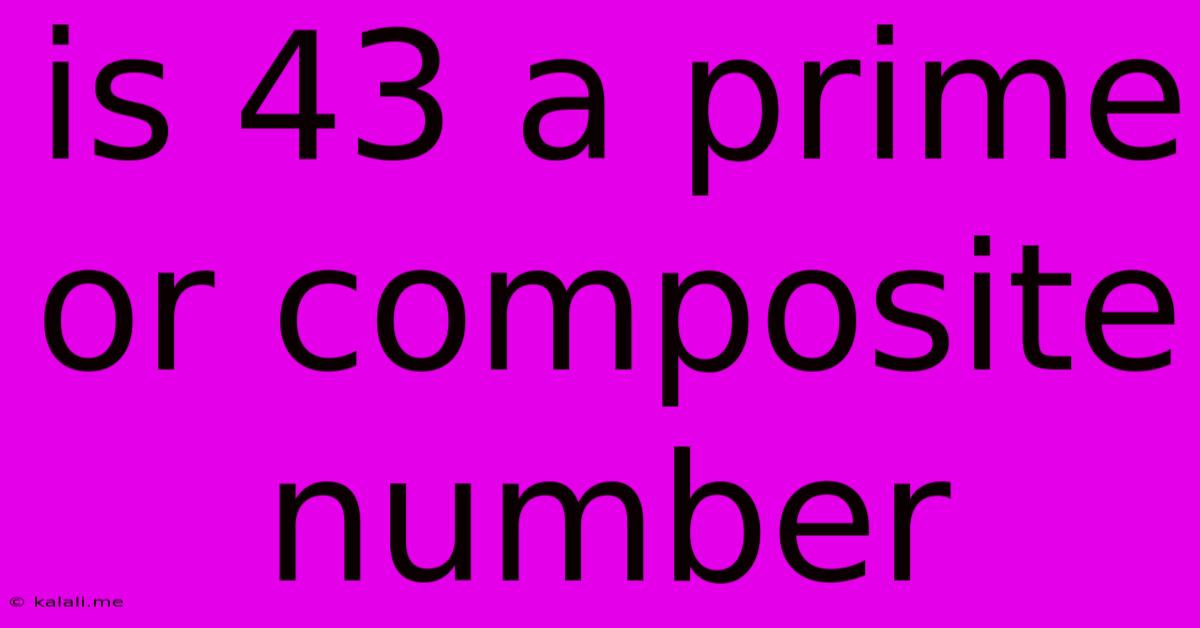Is 43 A Prime Or Composite Number
Kalali
Jun 15, 2025 · 2 min read

Table of Contents
Is 43 a Prime or Composite Number? A Simple Explanation
Is 43 a prime number or a composite number? This seemingly simple question touches upon a fundamental concept in mathematics: prime factorization. Understanding whether a number is prime or composite is crucial for various mathematical operations and applications. This article will definitively answer the question regarding 43 and delve into the concepts of prime and composite numbers.
Understanding Prime and Composite Numbers
Before we classify 43, let's define our terms:
-
Prime Number: A prime number is a whole number greater than 1 that has only two divisors: 1 and itself. This means it's not divisible by any other whole number without leaving a remainder. Examples include 2, 3, 5, 7, 11, and so on.
-
Composite Number: A composite number is a whole number greater than 1 that has more than two divisors. In other words, it can be divided evenly by at least one number other than 1 and itself. Examples include 4 (divisible by 1, 2, and 4), 6 (divisible by 1, 2, 3, and 6), and 9 (divisible by 1, 3, and 9).
Numbers less than or equal to 1 are neither prime nor composite.
Determining if 43 is Prime or Composite
To determine if 43 is prime or composite, we need to check if it's divisible by any whole number other than 1 and itself. Let's try dividing 43 by some smaller prime numbers:
- 2: 43/2 = 21.5 (not a whole number)
- 3: 43/3 = 14.333... (not a whole number)
- 5: 43/5 = 8.6 (not a whole number)
- 7: 43/7 = 6.142... (not a whole number)
We can stop checking here. The square root of 43 is approximately 6.56. If a number has a divisor greater than its square root, it must also have a divisor smaller than its square root. Since we haven't found any divisors up to the square root, we can conclude that 43 is not divisible by any whole number other than 1 and itself.
Therefore, 43 is a prime number.
Why is this important?
The classification of numbers as prime or composite is fundamental to various areas of mathematics, including:
- Cryptography: Prime numbers play a critical role in modern encryption techniques, ensuring the security of online transactions and sensitive data.
- Number Theory: Prime numbers are a central focus in number theory, a branch of mathematics dedicated to studying the properties of integers.
- Factorization: Understanding prime factorization helps simplify complex calculations and solve various mathematical problems.
Understanding the properties of prime and composite numbers provides a foundation for further mathematical exploration and problem-solving. The simple act of classifying a number like 43 as prime reinforces this foundational knowledge.
Latest Posts
Latest Posts
-
Is A Speaker An Input Device
Jun 16, 2025
-
Sound Travels Fastest In Which Medium
Jun 16, 2025
-
2 Elements That Are Liquid At Room Temperature
Jun 16, 2025
-
What Is The Greatest Angle Measure In The Diagram
Jun 16, 2025
-
Lowest Common Multiple Of 3 5 And 9
Jun 16, 2025
Related Post
Thank you for visiting our website which covers about Is 43 A Prime Or Composite Number . We hope the information provided has been useful to you. Feel free to contact us if you have any questions or need further assistance. See you next time and don't miss to bookmark.